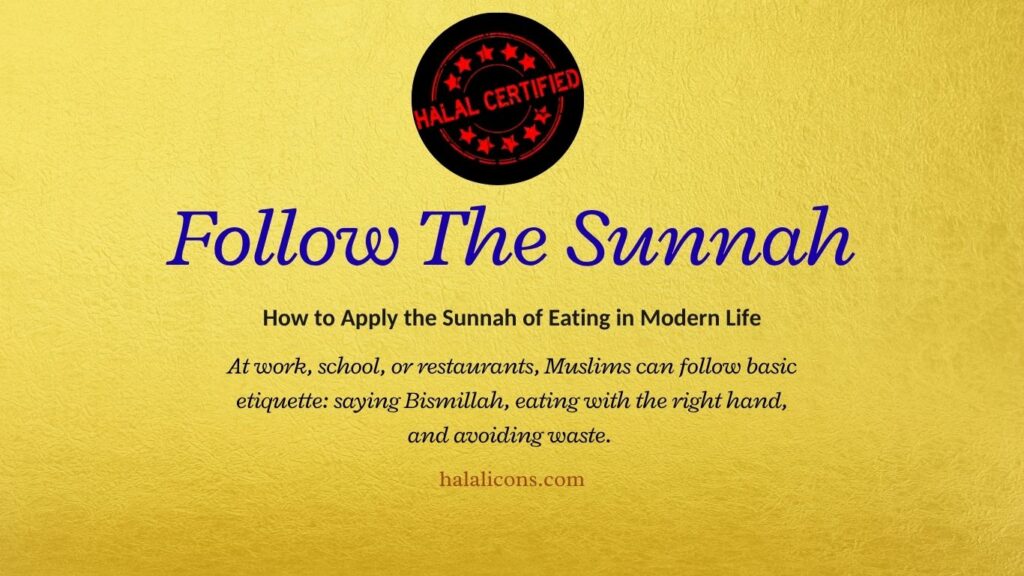Eating in Islam is not just about satisfying hunger — it’s a spiritual act guided by the Sunnah of eating. The Prophet Muhammad ﷺ taught specific etiquettes of eating and drinking that nurture gratitude, health, and discipline. Following the Sunnah of eating in Islam connects Muslims to prophetic manners and builds mindfulness in every bite.
From saying Bismillah before meals to eating with the right hand, these simple Sunnahs hold deep wisdom. Understanding and practicing these etiquettes of eating brings blessings (barakah) and strengthens our bond with the Creator, making even daily meals an act of worship.
Why Following the Sunnah of Eating Matters

The Sunnah of eating teaches Muslims that food is a blessing, not just a daily need. By following the etiquette of eating and drinking taught by the Prophet Muhammad ﷺ, we learn gratitude, self-control, and cleanliness.
Each action — from eating with the right hand to avoiding waste — reflects humility and respect for Allah’s blessings.
These Islamic dietary rules also promote good health and harmony in daily life. When we follow the Sunnah of eating in Islam, we turn a simple meal into an act of faith, gaining both physical benefit and spiritual reward through mindful, respectful eating.
You might also like: Are Cheetos halal
Pre-Meal Sunnahs & Etiquettes
Before starting a meal, the Prophet Muhammad ﷺ taught several simple yet meaningful Sunnahs. Saying Bismillah before eating is essential; if forgotten, one can say Bismillah fi awwalihi wa akhirihi. Washing hands properly shows respect for cleanliness and health.
Sitting humbly, not reclining, and eating with those around you fosters community and gratitude. Choosing halal and wholesome (tayyib) foods aligns with the Islamic dietary rules.
Even small acts, like sitting facing the Qiblah or preparing the meal with a grateful heart, are considered acts of worship. These pre-meal etiquette of eating bring spiritual and physical blessings to every meal.
Sunnahs During the Meal
During meals, following the Prophet’s ﷺ eating manners enhances both health and spirituality. Eat with the right hand, take small bites, and chew food thoroughly. Eat from what is nearest, avoiding unnecessary reaching, and never waste food. Moderation is key — the thirds of the stomach principle guides balanced eating.
Avoid blowing on food, complaining, or criticizing meals. Eating together fosters social harmony, and sharing food reflects generosity. Following these Prophetic eating manners not only strengthens spiritual discipline but also improves digestion and mindfulness. Every bite becomes an opportunity to practice gratitude and embody the Sunnah of eating in Islam.
Sunnahs After the Meal
After finishing a meal, the Prophet ﷺ recommended specific Sunnahs that maintain cleanliness and gratitude. Licking fingers before washing is a Sunnah, as is saying Alhamdulillah to thank Allah. Washing hands and rinsing the mouth preserve hygiene.
Avoid lying down immediately after eating to aid digestion. Thanking the host when eating with others reflects good manners. These post-meal etiquette of eating help cultivate mindfulness and humility.
Following them ensures physical health and spiritual reward. Incorporating these practices consistently allows Muslims to complete the cycle of the Sunnah of eating in Islam, turning each meal into a moment of reflection and devotion.
Duas Before & After Eating
The Sunnah includes specific supplications (duas) for before and after meals. Saying Bismillah before eating invites blessings, while Alhamdulillah allathee at’amana wa saqana is recited after finishing. These simple words connect Muslims to Allah and remind them that food is a gift. Including Arabic, transliteration, and translation ensures clarity for all readers.
Drinking water or milk also has its own recommended duas, as does consuming certain Sunnah foods. Practicing these Prophetic eating manners strengthens mindfulness, gratitude, and spiritual reward. Regularly reciting these duas before eating and after eating integrates the Sunnah fully into daily life.
Sunnah Foods the Prophet ﷺ Loved
The Prophet Muhammad ﷺ preferred simple, wholesome foods, which hold both spiritual and health benefits. Dates, lentils, honey, milk, olive oil, and ZamZam water are notable examples. These Sunnah foods are easy to digest, nutritious, and mentioned in hadiths.
Including them in your diet aligns with Islamic dietary rules and promotes overall well-being. Modern science confirms the benefits of these foods, showing that the Sunnah of eating combines spiritual guidance with practical health wisdom.
Eating these foods mindfully also allows Muslims to connect with prophetic traditions and gain reward, demonstrating the timeless relevance of the Sunnah in daily life.
Sunnah of Drinking
Prophetic guidance extends to drinking habits. Always drink with the right hand while sitting, take three moderate sips, and avoid blowing into the vessel. Saying Bismillah before drinking and Alhamdulillah afterward follows the Sunnah.
ZamZam water has special significance and benefits, as highlighted in the hadith. These Sunnah of drinking etiquette teach moderation, hygiene, and mindfulness. Practicing them ensures both physical health and spiritual reward.
By incorporating these simple habits, Muslims honor the Prophetic eating manners and maintain balance, demonstrating that even drinking is an act of worship when done following the Sunnah of eating and drinking in Islam.
The Wisdom Behind the Sunnah of Eating
The Sunnah of eating in Islam carries deep spiritual, social, and health wisdom. Spiritually, it cultivates gratitude, patience, and mindfulness. Socially, it teaches sharing, humility, and proper table manners.
Health-wise, moderation and mindful eating improve digestion and prevent overeating. Each practice, from saying Bismillah to finishing food properly, strengthens character and builds discipline. The Sunnah encourages Muslims to balance bodily needs with ethical and spiritual principles.
Practicing these Prophetic eating manners daily ensures holistic well-being. By following the Sunnah of eating, meals become opportunities to gain rewards, maintain health, and foster gratitude for Allah’s countless blessings.
Common Mistakes Muslims Make Today
Many Muslims unintentionally neglect the Sunnah of eating in daily life. Common mistakes include forgetting to say Bismillah, overeating, wasting food, eating alone, or being distracted by phones and screens.
Standing while eating unnecessarily and ignoring table etiquette are also frequent errors. Awareness of these mistakes helps Muslims return to the etiquette of eating and drinking taught by the Prophet ﷺ.
Correcting these habits ensures better health, social harmony, and spiritual reward. Even small improvements, like practicing moderation or eating mindfully, align daily routines with the Sunnah of eating in Islam, allowing individuals to benefit fully from the wisdom of prophetic guidance.
How to Apply the Sunnah of Eating in Modern Life

Implementing the Sunnah today is practical and rewarding. At work, school, or restaurants, Muslims can follow basic etiquette: saying Bismillah, eating with the right hand, and avoiding waste. Teaching children table manners, sharing food, and eating mindfully helps instill lifelong habits.
Meal planning with wholesome, halal foods reflects prophetic guidance. Simple tools like a printable checklist of the Sunnah of eating can serve as daily reminders. Even in a busy, digital world, practicing these Prophetic eating manners brings balance, gratitude, and spiritual reward. The Sunnah adapts beautifully to modern life, making every meal an act of devotion.
You might also like: Is Starbust Halal
FAQs
Is it Sunnah to lick fingers after eating?
Yes, the Prophet ﷺ practiced this, and it is recommended before washing.
Can you eat while standing?
It is preferable to sit, though standing is permissible when necessary.
What dua should I say before eating?
Bismillah is recited before starting meals.
Can I use a spoon or fork instead of fingers?
Yes, as long as it maintains cleanliness and etiquette.
How many Sunnahs of eating are there?
Scholars list around 21 major etiquettes covering before, during, and after meals.
Conclusion
The Sunnah of eating in Islam transforms ordinary meals into acts of worship, blending spirituality, health, and social etiquette. From pre-meal intentions to post-meal gratitude, every step reflects wisdom and prophetic guidance.
By following these Prophetic eating manners, Muslims gain physical benefits, spiritual reward, and a mindful approach to daily life. Start small — adopt one Sunnah at a time, teach it to your family, and make meals moments of reflection and devotion. Remember, every bite is an opportunity to follow the Sunnah and earn blessings (barakah) in both body and soul.
Fahad Ali is a youth mentor and social activist committed to empowering the next generation of Muslims. By addressing contemporary issues through an Islamic perspective, He guides young minds in navigating faith, identity, and personal growth in today’s world.